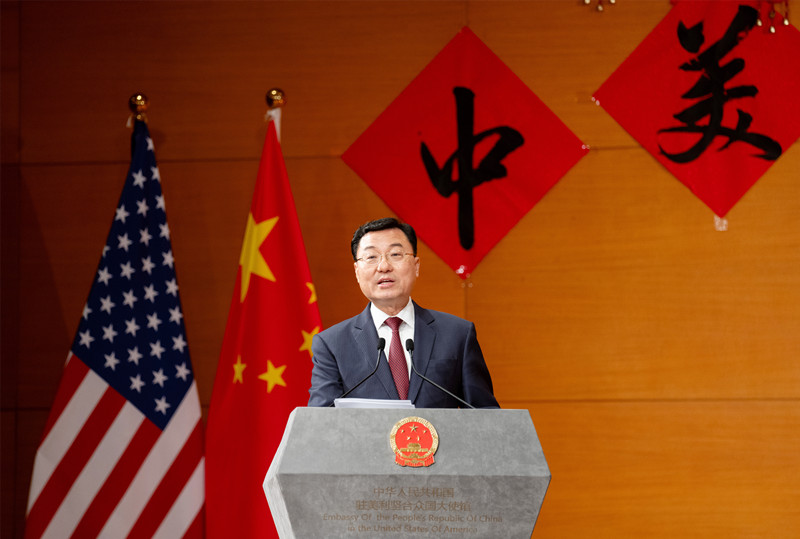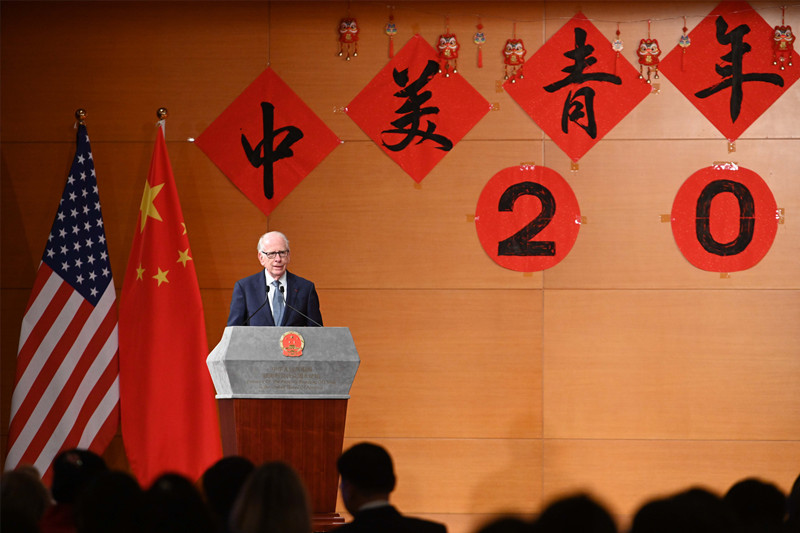 中文
中文
On January 28, 2024, the Chinese Embassy in the United States held an event to celebrate the 45th anniversary of the China-U.S. student exchanges and the Spring Festival Gala for Chinese and American youths. Chinese Ambassador to the United States Xie Feng attended the event and delivered remarks. Over 500 Chinese and American guests participated in the event, including Public Diplomacy Desk Officer of the Office of China Coordination at the U.S. Department of State Erik Black, International Affairs Specialist of the Office of the Secretary at the U.S. Department of Education Savannah Wallace, Chief Executive Officer of the Institute of International Education (IIE) Allan Goodman, Executive Director and Chief Executive Officer of the Association of International Educators (NAFSA) Fanta Aw, Chairman and President of the United States Heartland China Association (USHCA) Bob Holden, President of the U.S.-China Education Trust (USCET) Madelyn Ross, Vice President of the American Association of State Colleges and Universities (AASCU) Terry Brown, representatives from the American education community and students from both countries.

Ambassador Xie warmly welcomed the guests and expressed his heartfelt thanks and Chinese New Year greetings to all those who have witnessed, participated in and contributed to China-U.S. educational cooperation.

Ambassador Xie said that over the past 45 years, China-U.S. educational cooperation has boomed rain or shine, leaving behind many beautiful stories, cultivating world-renowned scholars and leaders, and yielding research findings with far-reaching influence. Millions of students and families in both countries have benefited from it. Educational cooperation has always been a vivid example of our two peoples reaching out to each other, and one of the most productive areas of people-to-people exchanges. It has also laid a solid foundation for the stable development of the overall bilateral relationship.
First, educational cooperation epitomizes the win-win nature of China-U.S. relations. There are nearly 290,000 Chinese students in the United States, accounting for about one-third of the total number of international students in the country. China has been the largest source of international students in the United States for 15 consecutive years. Educational cooperation has not only supplied a wealth of talents to China’s modernization drive and boosted U.S. economy and scientific development, but also contributed to human progress as a whole.
Second, educational cooperation demonstrates the openness and inclusiveness of the Chinese civilization. The Chinese civilization has been constantly enriched by drawing on the strengths of other civilizations, and educational cooperation is exactly an important part of China’s opening-up. China has the world’s largest education system, and ranks first in human resources in science and technology and the total number of researchers. Our two countries have every reason to learn from each other and progress together, jointly push the boundaries of human knowledge, and find solutions to global challenges such as climate change, food security and artificial intelligence.
Third, educational cooperation has built bridges for mutual understanding and affinity between Chinese and American peoples. From sending students to each other’s country to jointly running schools, from academic exchanges to research collaboration, our two countries have established an all-dimensional, multi-tiered and all-sectoral educational cooperation framework, nurturing mutual understanding and friendship between the two peoples.

Ambassador Xie stressed that although educational cooperation has come under headwinds in recent years, the aspiration of both peoples for mutual understanding and learning remains unstoppable, and those supporting China-U.S. educational cooperation have never been absent. To usher in another 45 years, we need to stay true to our original commitment, take educational cooperation to new heights despite all the difficulties, and find the right answers to three questions critical to China-U.S. relations in the new era.
First, the question of the century as to what is the right way for China and the United States to get along. Forestalling major-country conflict or confrontation is a constant endeavor of the international community. Whether China and the United States can properly handle their relations bears on the future of humanity. We hope that educational cooperation will continue to set the pace for China-U.S. relations, go beyond the Cold-war mentality and the obsession with fighting over the existing turf, and pool Eastern and Western wisdom together to seek common ground while reserving differences. We hope it will encourage the two countries to open up new arenas of cooperation such as digital economy and green and low-carbon growth, and help the two countries find the right way to get along in the new era.
Second, the question from our peoples as to how to clear obstacles to educational exchanges. The dynamism of thought springs from mutual learning, and scientific progress would be impossible without exchanges. But while the chilling effect of the “China Initiative” is still lingering on, the state of Florida recently rolled out a new law blocking Chinese researchers from labs of public universities. Also, dozens of Chinese arriving in the United States, including students, were denied entry every month for the past few months. They held valid visas, had no criminal records, and were returning to school after travelling elsewhere or reuniting with their family in China. But when they landed at the airport, what awaited them was 8-hour-long interrogation by officers, who prohibited them from contacting their parents, made groundless accusations against them, and even forcibly repatriated them and banned their entry. This is absolutely unacceptable. The Chinese side immediately expressed its firm opposition to the U.S. side. We will continue to resolutely safeguard the legitimate rights and interests of Chinese citizens. Politicizing and manipulating educational cooperation will not only prevent the students from chasing their dreams and force them to change their life plans, but also drain the talent pool of the United States, poison its research environment and chill innovation.
Third, the question of the times as to how to renew the friendship between our youths. To implement the initiative announced by President Xi in San Francisco of inviting 50,000 young Americans to China on exchange and study programs in the next five years, China will set up a YES program — the Young Envoys Scholarship, and encourage diverse forms of cooperation, such as exchange programs between schools, short visits, summer schools and winter camps. We welcome more young friends from the United States to see China with their own eyes, travel the expanse of the country with their own feet, and become the new generation of envoys of friendship between our two countries.
Ambassador Xie said President Xi stressed that the hope of the China-U.S. relationship lies in the people, and its future depends on the youth. How we view and conduct educational exchanges and cooperation today will shape China-U.S. relations in a significant way. Young people are known for their enthusiasm, courage, imagination and creativity. Ambassador Xie encouraged the youth to seize opportunities, explore possibilities, and make as many friends as they can, so as to fulfill themselves through educational cooperation, give a strong boost to the sustained growth of China-U.S. relations, and jointly write a new chapter in China-U.S. educational exchanges and cooperation.


Dr. Allan Goodman said in his remarks that those in the field of international education welcome President Xi's announcement in San Francisco that China is ready to invite 50,000 young Americans on exchange and study programs over the next five years. To implement the initiative, the Institute of International Education (IIE) and the China Education Association for International Exchange (CEAIE) are engaging in regular dialogues with American and Chinese universities on next steps, including co-hosting the China-U.S. Higher Education Dialogue and exploring how to lower the cost of travel for international students. He expressed his hope that the two countries will continue to promote friendly exchanges between the younger generations and together make the world a less dangerous place.
Dr. Fanta Aw pointed out that educational exchanges and cooperation are the most influential way to build bridges across cultures and to ensure a secure and prosperous future for humankind. China-U.S. student exchanges have not only forged bonds of friendship and mutual respect between the youths, but also benefited institutions and societies of both countries and the whole world. Quoting the proverb that “if you want to go fast, go alone; if you want to go far, go together”, she expressed her expectation for the two countries to continue close educational exchanges and cooperation.
Representatives from both countries who have studied in each other’s country over the past 45 years shared their personal experience, including Dr. Liu Baicheng, academician of the Chinese Academy of Engineering and one of the first batch of Chinese students sent to the United States in 1979; Ms. Madelyn Ross, one of the earliest American students who studied in China in the early 1980s and now President of the U.S.-China Education Trust; Mr. Richard Perry, an alumnus of Zhi-Xing China Fellowships; and Ms. Vivian Wang, Vice Provost of the University of Tulsa. They all expressed their anticipation for greater educational cooperation and people-to-people exchanges between the two countries.

After the opening session, Chinese and American students jointly presented a wonderful cultural performance to celebrate the upcoming Chinese New Year of Dragon. Students from Shenandoah University kicked off the cultural feast with a cheerful string quartet “Spring Festival Overture” and guitar duet “Plum Blossoms in the Snow”. Students from the Catholic University of America performed the Chinese song “By the Waterside”. Xuejuan Dance Ensemble performed the Chinese dance “Beacons From The Past”, and the popular Chinese dance “kemusan” presented by American students from Alice Deal Middle School brought the atmosphere to a climax. The vocal ensemble “Tomorrow Will Be Better” performed by Landon School brought the performance to an uplifting conclusion.


At the event, youth representatives of both countries also participated in the temple fair, where they visited the Chinese and American Young Artist Exhibition, and experienced traditional Hanfu, woodblock printing, paper-cutting and other traditional Chinese cultural activities. They made dumplings together, wrote Chinese New Year couplets, enjoyed Chinese delicacies and made friends in a warm and joyous atmosphere. They all expressed their best wishes for the upcoming Chinese Lunar New Year, and their hope that China-U.S. educational exchanges and cooperation will yields more fruits to the benefit of peoples in both countries and the world at large.
